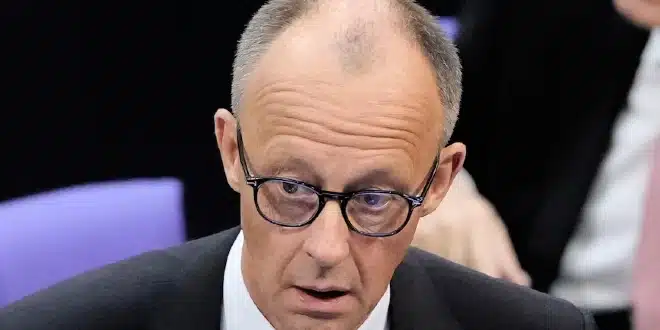Friedrich Merz has officially assumed the role of Germany’s chancellor after securing a majority in the Bundestag’s second round of voting on May 6, 2025. This followed an unexpected setback earlier that day when he failed to obtain the necessary votes in the initial ballot—a first in post-war German history. In the second vote, Merz received 325 votes, surpassing the required 316 in the 630-seat chamber. President Frank-Walter Steinmeier subsequently confirmed his appointment, marking the commencement of Merz’s tenure.
Coalition Dynamics and Initial Challenges
Merz’s election comes after the Christian Democratic Union (CDU) and its Bavarian sister party, the Christian Social Union (CSU), emerged as the leading force in the February 2025 federal elections, securing 28.6% of the vote. They formed a coalition with the Social Democratic Party (SPD), which experienced its poorest performance since World War II. Despite holding a nominal majority, internal dissent within the coalition led to Merz falling six votes short in the first round, highlighting potential fractures within the alliance. Analysts suggest that disagreements over fiscal policies and leadership approaches may have contributed to the initial voting shortfall.
The initial failure to secure the chancellorship has raised concerns about the stability and cohesion of the new government. Observers note that the narrow margin of victory in the second round could signal challenges ahead in implementing the coalition’s agenda, particularly in areas requiring unified support. The far-right Alternative for Germany (AfD), now the largest opposition party, has capitalized on these developments to question the government’s durability.
Policy Priorities and International Relations
Chancellor Merz has outlined a policy agenda focusing on economic revitalization, including proposals for corporate tax reductions, increased infrastructure investment, and reforms to Germany’s debt brake to allow greater fiscal flexibility. These initiatives aim to address the country’s recent economic stagnation and declining industrial output. However, internal resistance from fiscally conservative lawmakers within his coalition may pose obstacles to these plans.
On the international stage, Merz has emphasized a commitment to strengthening Germany’s role within the European Union and NATO. Ukrainian President Volodymyr Zelensky extended congratulations to Merz, expressing hope for continued German support in European and transatlantic affairs. European Commission President Ursula von der Leyen also welcomed Merz’s election, highlighting his experience and dedication to European integration.
Merz’s administration is expected to navigate complex geopolitical challenges, including managing relations with the United States amid shifting trade policies and addressing security concerns related to the ongoing conflict in Ukraine. His leadership will be pivotal in shaping Germany’s responses to these international developments.


